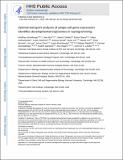| dc.contributor.author | Cleary, Brian Lowman | |
| dc.contributor.author | Lin, Stacie | |
| dc.contributor.author | Jaenisch, Rudolf | |
| dc.contributor.author | Regev, Aviv | |
| dc.contributor.author | Lander, Eric Steven | |
| dc.date.accessioned | 2020-03-26T18:55:47Z | |
| dc.date.available | 2020-03-26T18:55:47Z | |
| dc.date.issued | 2019-02 | |
| dc.identifier.issn | 0092-8674 | |
| dc.identifier.uri | https://hdl.handle.net/1721.1/124366 | |
| dc.description.abstract | Understanding the molecular programs that guide differentiation during development is a major challenge. Here, we introduce Waddington-OT, an approach for studying developmental time courses to infer ancestor-descendant fates and model the regulatory programs that underlie them. We apply the method to reconstruct the landscape of reprogramming from 315,000 single-cell RNA sequencing (scRNA-seq) profiles, collected at half-day intervals across 18 days. The results reveal a wider range of developmental programs than previously characterized. Cells gradually adopt either a terminal stromal state or a mesenchymal-to-epithelial transition state. The latter gives rise to populations related to pluripotent, extra-embryonic, and neural cells, with each harboring multiple finer subpopulations. The analysis predicts transcription factors and paracrine signals that affect fates and experiments validate that the TF Obox6 and the cytokine GDF9 enhance reprogramming efficiency. Our approach sheds light on the process and outcome of reprogramming and provides a framework applicable to diverse temporal processes in biology. | en_US |
| dc.description.sponsorship | National Institutes of Health (U.S.) (grant HD045022) | en_US |
| dc.description.sponsorship | National Institutes of Health (U.S.) (grant R01 MH104610-15) | en_US |
| dc.description.sponsorship | National Institutes of Health (U.S.) (grant R01NS088538) | en_US |
| dc.language.iso | en | |
| dc.publisher | Elsevier BV | en_US |
| dc.relation.isversionof | 10.1016/j.cell.2019.01.006 | en_US |
| dc.rights | Creative Commons Attribution-NonCommercial-NoDerivs License | en_US |
| dc.rights.uri | http://creativecommons.org/licenses/by-nc-nd/4.0/ | en_US |
| dc.source | PMC | en_US |
| dc.subject | General Biochemistry, Genetics and Molecular Biology | en_US |
| dc.title | Optimal-Transport Analysis of Single-Cell Gene Expression Identifies Developmental Trajectories in Reprogramming | en_US |
| dc.type | Article | en_US |
| dc.identifier.citation | Schiebinger, Geoffrey et al. "Optimal-Transport Analysis of Single-Cell Gene Expression Identifies Developmental Trajectories in Reprogramming." Cell 176 (2019): 928-943 © 2019 The Author(s) | en_US |
| dc.contributor.department | Massachusetts Institute of Technology. Department of Biology | en_US |
| dc.contributor.department | Massachusetts Institute of Technology. Computational and Systems Biology Program | en_US |
| dc.relation.journal | Cell | en_US |
| dc.eprint.version | Author's final manuscript | en_US |
| dc.type.uri | http://purl.org/eprint/type/JournalArticle | en_US |
| eprint.status | http://purl.org/eprint/status/PeerReviewed | en_US |
| dc.date.updated | 2020-02-19T18:47:49Z | |
| dspace.date.submission | 2020-02-19T18:47:51Z | |
| mit.journal.volume | 176 | en_US |
| mit.journal.issue | 4 | en_US |
| mit.license | PUBLISHER_CC | |
| mit.metadata.status | Complete | |
